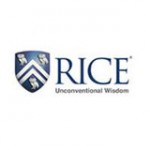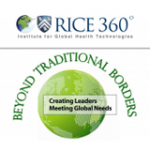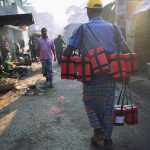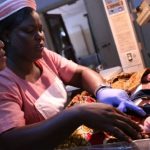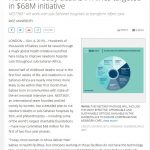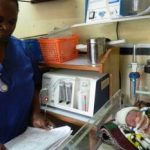
Rice University’s Rice 360° Institute for Global Health designs highly effective, low-cost health technologies that address critical public health needs in low-resource communities. Drawing on Rice’s foundational strengths in bioengineering, nanotechnology, and translational research, Rice 360° charges Rice University students with the task of developing affordable, portable healthcare technologies suitable for low-resource communities around the world. Rice 360° brings together an international group of faculty, students, clinicians, and private and public sector partners to design innovative health technologies for resource-poor settings, to develop and implement entrepreneurial approaches that increase access to these technologies around the world, and to prepare students to lead tomorrow’s global health technology workforce.
Our Mission
We innovate for global impact.
We discover and evaluate the biological and social factors that give rise to global health inequities.
We design scalable solutions to address unmet health needs around the world.
We educate multidisciplinary leaders who can solve complex global challenges.
We partner with local and international stakeholders to thoughtfully test and implement these innovative solutions.
We transform students into innovators
& ideas into sustainable solutions.
Newborn Essential Solutions and Technologies
Rice 360°, along with its partners at the University of Malawi College of Medicine, Northwestern University’s Kellogg School of Medicine, University of Malawi Polytechnic, London School of Hygiene and Tropical Medicine, and 3rd Stone Design, is developing an integrated set of 17 technologies used to treat medical issues commonly associated with preterm birth – Newborn Essential Solutions and Technologies (NEST). Building on the successful design and deployment of the Pumani bCPAP, Rice 360° aims to give babies in Africa the same chance of survival as babies born in the United States through its NEST devices used to treat neonatal jaundice, respiratory distress, hypothermia, and apnea. Our NEST initiative also includes training programs developed to build the technical and clinical capacity needed to use and maintain these technologies, ultimately supporting Rice 360° in preventing 85% of neonatal deaths in Malawi.
Global Health Undergraduate Program
Rice 360˚ has been widely recognized for its global health undergraduate program (previously known as Beyond Traditional Borders), an innovative global health technologies curriculum which incorporates high school, undergraduate, and graduate students. This curriculum places emphasis on the development of student-designed technologies aimed at addressing healthcare delivery challenges in low-resource settings.
Undergraduate students across all majors who participate in the curriculum may apply to complete a summer internship in Malawi, Brazil, or on the US-Mexico border. During this month-long stay, students have the opportunity to put their designs to work, testing their efficacy and durability. Each student keeps a blog during their stay, which can be found here. These students may choose to work on their designs up until they graduate, at which point they are often handed off to one of our Global Health Fellows or graduate students.
Global Health Fellows
Rice 360˚’s Global Health Fellows are post-baccalaureate students hired by Rice 360° to continue the design and revision process of the undergraduate students’ technologies. They work to streamline each design and prepare the technologies for eventual clinical trials at Rice 360˚’s partner hospital – the Queen Elizabeth Central Hospital in Blantyre, Malawi. Meet our current Global Health Fellows and follow their work here.
Our Partners
Rice 360˚’s partners—both domestic and international—support the development and eventual dissemination of our technologies by identifying needs for low-cost technologies and providing feedback on new designs.
To close the implementation gap and achieve real gains in global health, Rice 360° brings together leading expertise from the Jones Graduate School of Business, the James A. Baker III Institute for Public Policy, and the Rice Alliance for Technology Entrepreneurship to research and implement effective methods of delivery for appropriate health technologies in the developing world. Such methods might incorporate local resources and generate local economic growth and innovation. Rice 360° faculty members seek to understand the cultural determinants influencing technology adoption, as well as the means of production and distribution that will deliver technologies to people in need.

